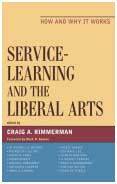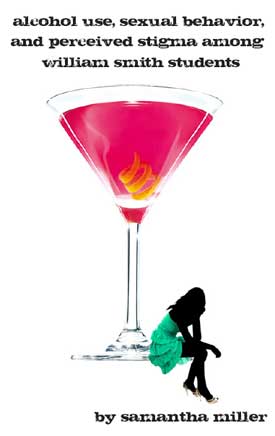Faculty Curriculum Development
Need for Curriculum Infusion : Faculty Course Development : Faculty/Student Collaboration : Workshops to Grow Curriculum Infusion : Co-curricular Activites

On the need for curriculum infusion...
- by David W. Craig and H. Wesley Perkins in Service Learning and the Liberal Arts: How and Why it Works, Craig A. Rimmerman (editor). (order at Lexington Books, full publication)
"Encouraging
Faculty Leadership In Prevention"
Presentation by Drs. Perkins and Craig at the 1998
National Meeting on Alcohol, Other Drug, and Violence Prevention in Higher
Education
- This presentation describes the model for developing and encouraging
curriculum infusion in colleges and universities as part of a comprehensive
alcohol and other drug prevention program.
Links can be found in this presentation to examples of how each element of the model has been implemented at Hobart and William Smith Colleges.
Faculty course development...
Alcohol Use And Abuse: Causes And ConsequencesBidisciplinary Course with Entire Syllabus and Extensive Resource Links Here
- This course, co-taught by faculty in sociology and biochemistry, examines the causes and consequences of alcohol use in terms of its biochemical and social construction. This course brings together natural science and social science contributions to the interdisciplinary study of this phenomenon by incorporating a variety of academic perspectives including biology, chemistry, social psychology, epidemiology, and sociology and by making extensive use of multimedia and world wide web resources. It has been recognized nationally as a model for courses about substance use and abuse.
Alcohol in College: What is Myth? What is Reality?
First Year Seminar Course with Entire Syllabus Linked Here
- Participants in this seminar examine this problem from both natural scientific and social scientific perspectives. Readings include public health and social science research literature on the scope of alcohol use in college and the theories proposed to explain that use. The natural science literature is used to explore the pharmacologic effects of alcohol on the brain, related health risks, and the relationship of blood alcohol concentration to risk and harm. Seminar participants participate in ongoing research on the scope and consequences of alcohol use on this campus. Data collection activities include monitoring late night blood alcohol levels by breathalyzer as students return home to residence halls and using remote audience response devices in residence hall programs to collect survey data on attitudes, perceptions, and experiences with alcohol. Finally, educational models for abuse prevention and harm reduction are explored and evaluated for effectiveness.
- Sample poster created by students reporting the results of their research (click here)
Chemistry Research Seminar Series
- The chemistry department sponsors a weekly evening seminar for undergraduate science students and faculty. Visiting research scholars, Hobart and William Smith Colleges' faculty, and research students make presentations at these seminars. We have been averaging around 100 students and faculty in attendance at these seminars. The 1999 seminar series was kicked off with a seminar on the pharmacology and metabolism of alcohol by Professor David W. Craig. This seminar has been repeated in subsequent years during alcohol awareness week. Research on late night blood alcohol measurements have also bee reported in this seminar.
Faculty/Student Collaboration...
Alcohol Inquirer
- This page serves as the communication outlet for course-work relating
to alcohol for the rest of the Hobart and William Smith community and
beyond. Results from surveys, slide shows from faculty lectures, special
interest stories and student video clips are reported here. Please be
advised that the videos require the appropriate add-in for your browser
and may take considerable time to download if you are off campus.
- New 2007 Version 2: DigitalWebBooks
format reader required to view this 2007 multimedia extravaganza
edition.
Click the button to install the reader. This only needs to be done once on your computer.
- Version 1: Web-based news reports from students and faculty on alcohol
- New 2007 Version 2: DigitalWebBooks
format reader required to view this 2007 multimedia extravaganza
edition.
Blood
Alcohol Concentration/Breathalyzer Research Program
Undergraduate independent study program
- This reseach program, directed by Professor David W. Craig(Department of Chemsitry), has been designed to assess the blood alcohol concentration (BAC) of students returning home to residence halls late at night. Over 1,000 students have been randomly selected to participate. Sample results from this project can be seen at this link. All measurements have been completed by undergraduate research students. Results have been presented on campus in various settings by student researchers .
- Sample research poster of results (click here).
Alcohol and
Sexual Health Honors Research
Undergraduate independent study program
- This reseach program, directed by Professor H. Wesley Perkins (Department of Anthropology and Sociology), has been designed to offer students experience in conducting survey research and data analysis on collegiate alcohol use and health. Students design a web-based survey instrument, prepare a proposal to the institutional research board (IRB), admininster the survey, analyze the data, and write a research thesis. A sample "zine" created by Samantha Miller can be seen by clicking the cover at right.
Workshops to grow curriculum infusion...
2001 Summer/Fall Faculty Panel Development Workshop- This two-day workshop sponsored with funding from the U.S. Department of Education was designed to provide some time and resources for faculty from a variety of disciplines to get together to discuss ways in which they might develop two evening facutly panel events that integrate alcohol and other drug content with films, readings, and discussions from classes during the term.
2000 Teacher Education Workshop On Alcohol Abuse In Adolescence
- Alcohol abuse in adolescence is the most persistent and pervasive problem negatively affecting the physical health, emotional well-being and educational performance of students, both inside and outside the classroom and recent studies have linked early drinking behavior to later alcoholism. It is important that teachers be fully aware of 1) the patterns and problems of youthful alcohol abuse, 2) the resources available to become more knowledgeable about the complexities of the problem, and 3) the varied opportunities to bring these issues into the classroom in a variety of course subjects and in informal discussions with students. In order to enhance teacher awareness in these areas, the Alcohol and Other Drug Education Project of Hobart and William Smith Colleges sponsored a workshop for local area professionals working in secondary education and for college students at Hobart and William Smith preparing for careers in education.
1997 Summer Curriculum Development Workshop On Alcohol And Other Drugs
- This workshop was designed to provide some time and resources for faculty from a variety of disciplines to get together to discuss ways in which they might integrate readings, discussion, projects, etc. about alcohol and other drugs into their existing courses or into new courses they plan to develop.
1997-1998 Curriculum Infusion In Response To Faculty Workshop
- Faculty participants have introduced topics about alcohol and other drugs into several of their courses in response to the 1997 Summer Workshop. Brief follow-up reports (August, 1998) from participants representing various disciplines are provided as examples.
1999 Teacher/Administrator Education Workshops On Alcohol Abuse In Geneva City, Ithaca And Seneca County Schools
- Alcohol abuse in high school and middle school students is a problem negatively affecting the physical health, emotional well-being and educational performance of students, both inside and outside the classroom and recent studies have linked early drinking behavior to later alcoholism. In an effort to educate teachers and administators of the Seneca County, Ithaca City, and Geneva City School districts, the Alcohol and Other Drug Education Project of Hobart and William Smith Colleges sponsored workshops for professionals working in Sececa County, Ithaca, and Geneva City School Districts. These workshops introduced the school districts' representatives to the "social norms" approach to education, ways to carry out the social norms model and disseminate its information, and the social norms impact on the Hobart and William Smith campus.
1998 Teacher Education Workshop On Alcohol Abuse In Adolescence
- Alcohol abuse in adolescence is the most persistent and pervasive problem negatively affecting the physical health, emotional well-being and educational performance of students, both inside and outside the classroom and recent studies have linked early drinking behavior to later alcoholism. It is important that teachers be fully aware of 1) the patterns and problems of youthful alcohol abuse, 2) the resources available to become more knowledgeable about the complexities of the problem, and 3) the varied opportunities to bring these issues into the classroom in a variety of course subjects and in informal discussions with students. In order to enhance teacher awareness in these areas, the Alcohol and Other Drug Education Project of Hobart and William Smith Colleges sponsored a workshop for local area professionals working in secondary education and for college students at Hobart and William Smith preparing for careers in education.
Co-curricular activities...
1997-1999 Co-Curricular
Campus Activitiespage last modified: 10/16/2012

